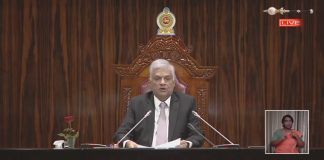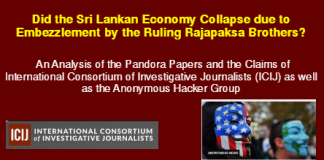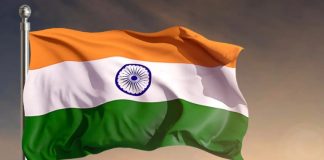ජනාධිපති රනිල් වික්රමසිංහ පළමු පාර්ලිමේන්තු සැසිවාරය විවෘත කරමින් සිදුකළ සම්පුර්ණ ප්රකාශය
Did the Sri Lankan Economy Collapse due to Embezzlement by the...
Sri Lanka banks cut foreign borrowings, see more deposit dollarization
ECONOMYNEXT – Sri Lanka’s banks have sharply cut foreign borrowings over the past year, official data show as the country ran out of rating space after seven years of state expansion and monetary indiscipline.
State and private commercial bank borrowing heavily to abroad to buy dollar denominated Sri Lanka Development Bonds, give offshore banking unit loans to the government after 2015 which expanded from 17 to 20 percent of GDP over 5 years.
State-run Ceylon Petroleum Corporation also borrowed each time money was printed to suppress rates, under ‘flexible inflation targeting’.
Meanwhile some banks also bought discounted international sovereign bonds as foreign investors dumped them.
However as downgrades came swiftly during 2020 as money printing ratcheted up creating forex shortages banks lost the ability to borrow abroad and could not renew loans as counterparty funding limits were cut.
Short term foreign currency borrowings of banks had peaked at 4.6 billion US dollars in the third quarter of 2020, central bank data show and had fallen to 1,442 billion US dollars by the first quarter of 2021 in a steep correction.
Long term loans which were around 1.5 billion US dollars in the first quarter of 2020 fell to 1,072 million by the first quarter of 2021.
Short term currency and deposits of commercial banks went up from about billion US dollars in the first quarter of 2020 to around 4.3 billion US dollars by the first quarter of 2022.
Sri Lanka in 2020 introduced special deposit schemes also to draw foreign funds.
Meanwhile some who had invested in SLDBs had also started to pull out fearing a hair-cut.
Data show that foreign borrowings of banks ratcheted up in the 2015/2016 and 2018 currency crises which were triggered money printed to suppress interest rates under ‘flexible’ inflation targeting, a highly unstable monetary regime peddled by Western Mercantilists to third world countries with ‘fear of floating’.
Sri Lanka also has fear of hard-pegging.
Sri Lanka expanded the state from 2015 to 20 percent of GDP from 2017 after abandoning spending based consolidation (cost cutting) under revenue based consolidation despite having a bloated state and an oversized military.
Revenue based consolidation (expanding the state with a higher level of taxes) as well as borrowings have long been advocated by the Janatha Vimukthi Peramuna and is also generally followed by other leftists and American progressives.
During repeated currency crises under ‘flexible’ inflation targeting up to 2019, Sri Lanka also borrowed heavily through International Sovereign bonds as the country lost the ability to repay maturing debt in rupees, forcing foreign borrowings to go up at the gross financing level.
State-run Ceylon Petroleum Corporation also borrowed from commercial banks and suppliers as forex shortages from liquidity injections made under flexible inflation targeting created forex shortages making difficult for the CPC to convert rupees to dollars.
In 2019 as the impact of state expansion under revenue based fiscal consolation and the foreign borrowings under flexible monetary policy became clear, analysts warned that the country would soon run out rating space and to discontinue unrestrained monetary policy.
“Sri Lanka is a country that had mostly kept monetary stability in the worst years of the war with the help of the ideology then prevailing,” EN’s economic columnist Bellwether warned in December 2019 as money printing began around August with the rating at B.
“But now each new episode of monetary indiscipline is costing the country one notch in the rating scale.
“Sri Lanka will soon run out of rating space to tap capital markets if the flexible exchange rate/call money rate targeting continues in the next recovery space.
“Sri Lanka will face credit downgrades and possible sovereign default of dollar debt unless the highly unstable discretionary ‘flexible exchange rate’ is restrained and some monetary discipline is brought in.
“Pakistan, whose central bank also prints money with a peg, and frequently runs to the IMF now has a B- rating. But B- is barely above CCC.
“From two levels below investment grade in 2005, Sri Lanka is now a little above CCC, which is a distressed debt level. It is not a place to take monetary risks in particular.
“The central bank and others are talking about the need to get down interest rates,” the column which was written before the 2019 elections but money printing through outright purchases had started around August of the year said.
“That is not re-asssuring.
“It is doubtful whether China will give loans like earlier to boost growth as it is having its own troubles. China’s flexible exchange rate is taking a toll, as are state owned enterprises. However China may give debt relief to Sri Lanka.
“If rates are cut further and money is printed, the recovery in 2020 will be short-lived or not at all, and another currency crisis will be generated and downgrades will follow.”
Int. Red Cross Fedration appeals for 28.9 mln USD humanitarian funding...
ECONOMYNEXT – The International Federation of Red Cross and Red Crescent (IFRC) has made an international appeal to raise 28 million Swiss francs (28.9 million dollars) for urgent humanitarian assistance to help 2.4 million most vulnerable Sri Lankans affected by the economic crisis.
“The effects of the economic crisis are being felt in every single sector. The economic crisis is plunging those most vulnerable – some 2.4 million people already living below the poverty line into despair,” IFRC’s Special advisor for Humanitarian Crises and Emergencies Maryann Horne said.
“With no income, people are barely able to cope and are now selling their assets, getting into debt, being forced to cut down on food while many children are not able to go to school.
“The emergency appeal will allow the most urgent humanitarian needs to be met. It will help prevent those most vulnerable at a time people have no cash, no jobs, and no fuel.”
IFRC through the local Red Cross representative SLRCS has provided over 10,000 dry ration food packs and 4000 cash grants in 25 districts and 5000 school packs have been given out in 10 districts.
It has also provided ambulance services to over 1000 people in the recent protests.
“…It’s even worse for single-parent households, and millions who cannot work or send their children to school because of the fuel crisis,” Sri Lanka Red Cross Secretary General, Mahesh Gunasekara, said.
“We need international support now to help millions of people pull their lives back together and avoid the worse. We need to act early to ensure lives can be saved.” (Colombo/July22/2022)
China’s Jinping offers help to Sri Lanka’s Wickremesinghe government
ECONOMYNEXT – Chinese President Xi Jinping expressed his willingness to the government of Sri Lanka’s new president Ranil Wickremesinghe to the best of his ability for the island nation’s leader and its people.
Jinping’s congratulatory message, the first from a foreign country, came as the new president was widely condemned for his ordering the island nation’s military to attack and remove the protesters from the main protest site near the presidential secretariat.
“I attach great importance to the development of China-Sri Lanka relations, and am willing to provide support and assistance to the best of my ability for you and the Sri Lankan people in your efforts,” Jinping said in a statement.
“I believe that under your leadership, Sri Lanka will be able to overcome temporary difficulties and advance the process of economic and social recovery.”
“It is hoped that the two sides will carry forward the traditional friendship, consolidate political mutual trust, and push forward the strategic cooperative partnership of sincere mutual assistance and ever-lasting friendship between two countries.”
Wickremesinghe has been elected as the president by the parliament for the rest of the tenure of former leader Gotabaya Rajapaksa who fled the country and resigned from Singapore. Rajapaksa fled after three months of the protests for his failure to address economic crisis, which later turned into a political crisis.
The same protesters who forced Rajapaksa to flee were attacked by the military under the state of emergency declared by Rajapaksa.
China has invested billions of dollars, but pressure from India and the West has been a deterrent for successive Sri Lankan government deal with China, which is accused of dragging Sri Lanka into a debt trap.
India and the United Stated have raised concerns over increasing Chinese presence in Sri Lanka which they say could be a security threat for Indian Ocean. China has said its interest in Sri Lanka is only commercial. (Colombo/July 23/2022)
India All-Party meet heats up on Sri Lanka Crisis
India All-Party meet heats up on Sri Lanka Crisis
Ranil Wickremesinghe wins Sri Lanka’s crucial presidential vote
ECONOMYNEXT – Sri Lanka’s parliament elected Acting President Ranil Wickremesinghe as the 8th Executive President on Wednesday (20) with 134 lawmakers in the 225-member parliament voting in favour of the government-backed candidate.
The new vote came after the former leader Gotabaya Rajapaksa fled the country and resigned last week from Singapore, plunging the country into deep political crisis after months-long protests against him.
The protests came after Rajapaksa’s wrong economic and agricultural policies hit the country with dollar shortages following the Central Bank printing of trillions of rupees while maintaining a soft peg against the currency.
The country is still facing shortages of fuel, cooking gas, and medicines while it is also facing a looming food shortage.
Wickremesinghe was appointed as a PM of the country for the 6th time in May although he had only one seat in the parliament. He came to parliament on a residual vote total after his party had a humiliating defeat in 2019 Presidential elections.
At the election, 223 MPs cast their votes with two abstaining making the total count of valid votes at 219.
Candidates Dallas Alhahepperuma got 82 votes and Anura Kumara Dissanayake got only three votes.
(Colombo/Jul20/2022)
Sri Lanka’s crucial presidential vote becomes two-horse race
ECONOMYNEXT – Sri Lanka’s upcoming election in parliament for an interim president has effectively become a two-horse race with two strong contenders emerging following the last minute dropout of opposition leader Sajith Premadasa.
The candidatures of Acting President Ranil Wickremesinghe, ruling Sri Lanka Podujana Peramuan (SLPP) MP Dullas Alahapperuma and National People’s Power (NPP) MP Anura Kumara Dissanayake were proposed and seconded in parliament Tuesday July 19 morning.
Parliament called nominations for the vacancy left by the resignation of former President Gotabaya Rajapaksa who fled the country on July 13 following massive protests demanding his resignation.
Wickremesinghe’s name was proposed by Minister Dinesh Gunawardena and was backed by Minister Manusha Nanayakkara amid some hooting from the opposition benches.
Opposition leader Premadasa, who had previously announced that he was contesting, proposed Alahapperuma’s name which was seconded by SLPP Chairman and parliamentarian G L Peiris.
NPP MP Vijitha Herath proposed the name of party leader Dissanayake for the position, seconded by his colleague Harini Amarasuriya.
With Premadasa’s Samagi Jana Balavegaya (SJB), the main opposition, backing Alahapperuma and the NPP only holing three seats in parliament, Alahapperuma’s chances against Wickremesinghe are now looking better.
At least 105 SLPP members have met Wickremesinghe and discussed their grievances, particularly regarding new housing in place of their homes that were burnt by angry mobs on May 09. SLPP general secretary Sagara Kariyawasam has said the SLPP will back Wickremesinghe, a statement later contradicted by party chair Peiris.
Sri Lanka’s parliament has 225 members. Over half a dozen members are abroad and may return today for the vote tomorrow.
The Sri Lanka Freedom Party (SLFP), which has around 15 members, has said they will stay out of the vote in a bid to push for a consensus candidate. But at least 10 may break ranks, reports said.
SLFP chief ex-President Maithripala Sirisena has claimed that large sums of money was being offered to buy legislators.
Sri Lanka is going through its worst economic crisis since Independence, with a crippling dollar shortage resulting in long queues for fuel, cooking gas and other essentials.
The country has also seen much unrest in recent weeks, with protests intensifying and leading to confrontations between protestors and security forces.
While activists and opposition lawmakers accuse the government of overreach and violent suppression of peaceful protest, the government claims that “fascist” elements within the protest movement are deliberately engaging in violence seeking to destabilise the country. (Colombo/Jul19/2022)
Sri Lanka continues monetary financing of imports, pegging after ‘running out’...
ECONOMYNEXT – Sri Lanka’s central bank has spent 222.73 million US dollars defending a peg and engaging in monetary financing of imports in June 2022, three months after apparently ‘running out’ of reserves, official data show.
Sri Lanka defaulted in April 2012 after two years of money printing to suppress interest rates combined with tax cuts in the worst currency crisis triggered by the central bank in its history.
At the time officials said the country had run out of reserves.
In March the rupee collapsed from 200 to 360 to the US after a botched attempt at floating (suspending convertibility) with a surrender rule (forced dollar sales to the central bank) and too low policy rates to curtail credit.
However the central bank continued to intervene in forex markets in both sides of a peg (now around 360 to the US dollar).
In June the central bank had bought 68 million dollars from banks, which are experiencing severe forex shortages due to a dysfunctional peg, down from 76.6 million US dollars a month earlier, putting pressure on the peg.
The central bank then sold 222.74 million dollars to defend the peg, engaging in monetary financing of imports.
The central bank gets deferred payments from the Reserve Bank of India and spends them on monetary financing of imports getting deeper into debt.
After giving dollars for imports, a pegged central bank then sterilizes the intervention injecting new money to maintain a policy rate and prevent reserve money from shrinking, effectively monetary financing imports by replacing lost rupee reserves in banks.
Related
Sri Lanka imports surge to US$2.2bn in Dec 2021 after reserves sales
However June reserve money growth slowed amid high interest rates, and is appearing to be shrinking in July as the economy is smashed by high interest rates and forex shortages.
In Sri Lanka there is a strong belief among economists who have rejected classical theory and also the business community that reserves should be used to finance imports and help the country live beyond its means due to the rejection of classical economics.
There were widespread calls for monetary financing of imports in Sri Lanka despite the country running low in early 2021 and imports having shot up over 2.0 billion US dollars by December after three months of sterilized interventions between 300 to 400 million US dollars a month.
Interventions are sterilized with the acquisition of government securities in banks, not private securities unlike in the days of the classical greats when central banks operated a floating policy rate against bankers acceptances, and it appears as budget financing to later observers. (Sri Lanka, world’s poor suffers from Fed’s accidental discovery)
After printing money to create forex shortages Sri Lanka’s economists in authority also have a habit of importing fuel on credit further boosting imports and getting state enterprises in to debt.
However after a default in April 2012 the time honoured tactic of indebting the CPC is no longer possible and oil imports have been settled quickly line any other import.
Sri Lanka also tried to get 6.0 billion US dollars of ‘bridging finance’ for imports and other spending in 2022 after defaulting in April 2012.
Since defaulting in April and running out of reserves, 337 million dollars had been spent on interventions with energy sector officials in particular pressing the central bank for money to import oil via pegging (weak side convertibility).
Clean floating central bank do not give a cent for imports.
Economists in authority Sri Lanka got the ability to create currency crises on August 28, 1950 with the creation of a money printing soft-peg after abolishing a hard peg that had kept the country stable for almost 70 years.
Analysts had warned that contradictory policy and a botched float would lead to continued monetary instability and high interest rates with damaging effects on the banking system unless a working monetary regime is established. (Colombo/July18/2022)



